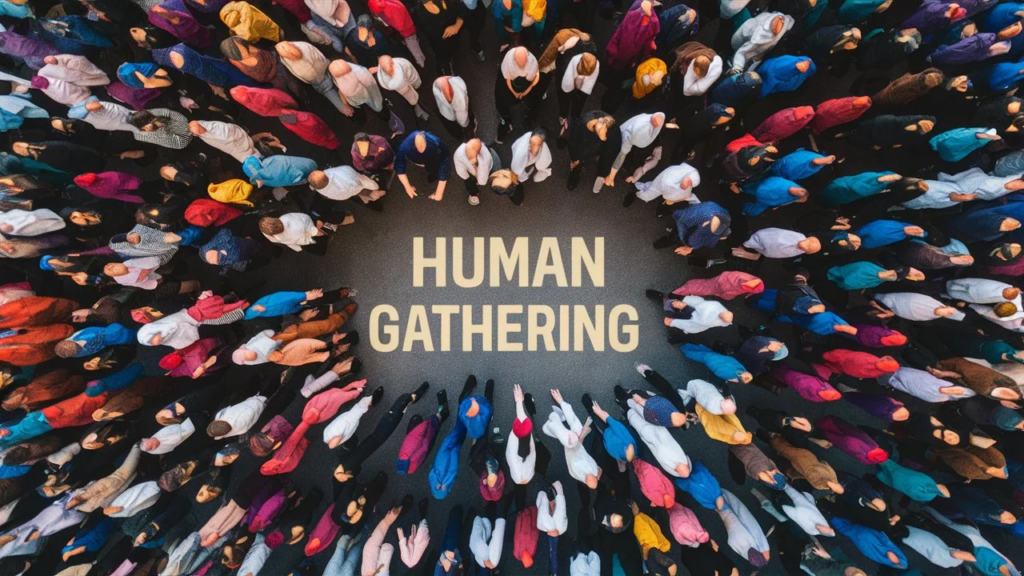In the age of digital media, the authenticity of human gatherings has come under scrutiny. With the proliferation of social media platforms, it has become increasingly difficult to discern actual events from staged ones. This phenomenon, often called “human gathering fake,” raises important questions about our social interactions and the information we consume. This article delves into the intricate world of human gatherings, exploring the factors contributing to their authenticity or lack thereof.
The Rise of Staged Events
The Influence of Social Media
Social media has revolutionized the way we interact and share experiences. Platforms like Facebook, Instagram, and Twitter allow us to broadcast our lives to a global audience. However, this has also given rise to a culture of performance, where individuals and organizations stage events to create a desired image. “human gathering fake” aptly describes these manufactured events designed to appear genuine.
One significant factor contributing to this trend is the desire for online validation. Likes, shares, and comments have become digital currencies, incentivizing users to create content that attracts attention. This has led to staging events that might have yet to occur naturally, purely for social media clout.
The Role of Influencers
Influencers play a pivotal role in shaping perceptions of reality. With millions of followers, they can sway opinions and set trends. Many influencers collaborate with brands to organize events that showcase products or services. While these events might appear spontaneous, they are often meticulously planned and executed. This blurring of lines between genuine and staged gatherings can leave audiences questioning the authenticity of what they see online.
The Impact of Fake Gatherings
Erosion of Trust
The prevalence of fake gatherings has significant implications for trust. When individuals are repeatedly exposed to staged events presented as accurate, it becomes challenging to distinguish between reality and fabrication. This erosion of trust extends beyond social media, affecting how we perceive news, advertisements, and even personal relationships.
Psychological Effects
The constant exposure to seemingly perfect gatherings can also have psychological effects. Social comparison theory suggests that people evaluate themselves based on comparisons with others. When individuals are bombarded with images of flawless gatherings, they may feel inadequate or envious, leading to negative self-perception and decreased mental well-being.

Identifying Authentic Gatherings
Key Indicators of Authenticity
Despite the prevalence of staged events, there are ways to identify authentic human gatherings. One key indicator is the presence of genuine interactions. Real gatherings often feature spontaneous moments and unplanned activities that are difficult to replicate in staged events. Additionally, authentic gatherings tend to have diverse participants, reflecting the organic nature of social interactions.
Transparency and Accountability
Transparency is crucial in distinguishing real gatherings from fake ones. Organizers and participants who are transparent about an event’s purpose and planning are more likely to be involved in authentic gatherings. Accountability also plays a role; individuals willing to take responsibility for their actions and decisions are often more credible.
The Role of Technology
Advances in Deepfake Technology
The advent of deepfake technology has further complicated the issue of authenticity. Deepfakes use artificial intelligence to create hyper-realistic images and videos that can be indistinguishable from reality. This technology can potentially be used in staging fake gatherings, making it even harder for audiences to discern truth from fabrication.
The Need for Digital Literacy
As technology continues to evolve, digital literacy becomes increasingly important. Educating individuals on evaluating online content critically can help mitigate the impact of fake gatherings. Digital literacy programs should focus on teaching people how to identify signs of manipulation and understand the motivations behind staged events.
Ethical Considerations
The Responsibility of Content Creators
Content creators, including influencers and event organizers, must consider the ethical implications of their actions. Staging events for personal or commercial gain can have far-reaching consequences on public trust and mental health. Ethical content creation involves being transparent with audiences and prioritizing authenticity over performance.
The Role of Social Media Platforms
Social media platforms also have a role to play in addressing the issue of fake gatherings. By implementing stricter policies and algorithms to detect and flag staged content, these platforms can help maintain the integrity of online interactions. Additionally, providing users with tools to report suspicious content can empower communities to hold creators accountable.
Moving Towards Authenticity
Encouraging Genuine Interactions
To combat the rise of fake gatherings, it is essential to encourage genuine interactions. This involves creating spaces where people feel comfortable being themselves without the pressure to perform for an audience. Community events, local meetups, and offline gatherings can foster real connections not driven by the need for social media validation.
Building a Culture of Trust
Building a culture of trust requires collective effort. By valuing honesty and transparency in our interactions, we can create an environment where authenticity is prioritized. This cultural shift can help reduce the prevalence of fake gatherings and restore faith in the authenticity of social interactions.

Conclusion
The “human gathering fake” phenomenon reflects broader societal changes brought about by digital media and technology. While staged events have become more common, there are ways to identify and promote authentic gatherings. By fostering digital literacy, encouraging transparency, and building a culture of trust, we can navigate the complexities of the modern social landscape.
Ultimately, authenticity in human gatherings is not just about distinguishing real from fake but about preserving the integrity of our social interactions in an increasingly digital world.


